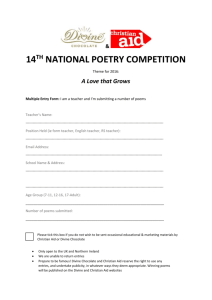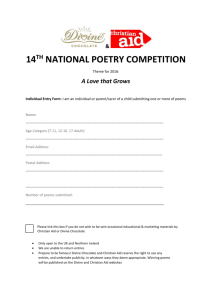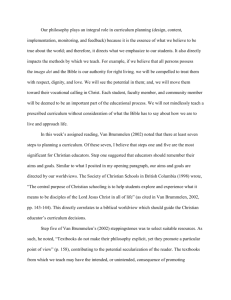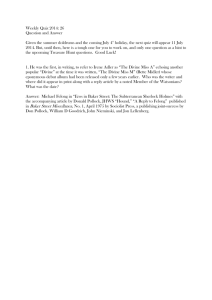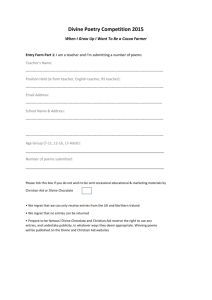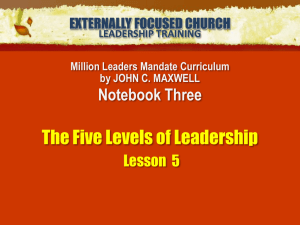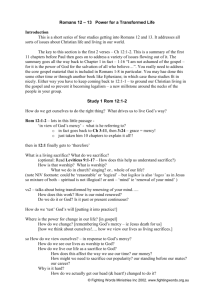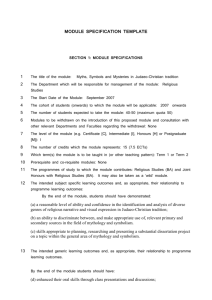law
advertisement
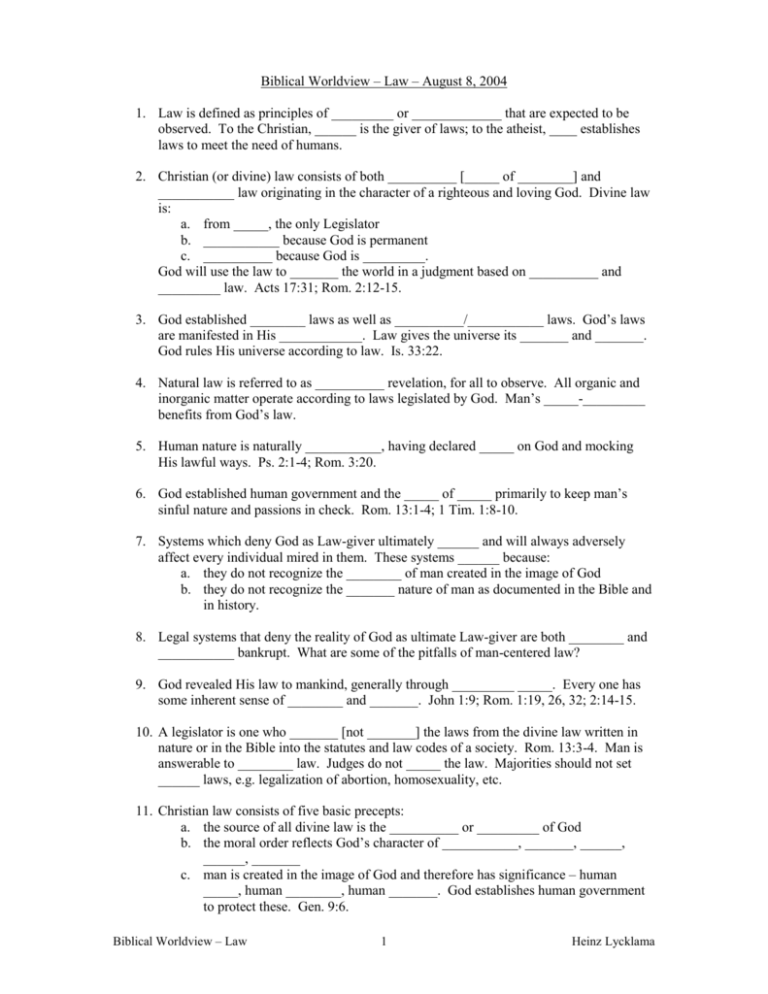
Biblical Worldview – Law – August 8, 2004 1. Law is defined as principles of _________ or _____________ that are expected to be observed. To the Christian, ______ is the giver of laws; to the atheist, ____ establishes laws to meet the need of humans. 2. Christian (or divine) law consists of both __________ [_____ of ________] and ___________ law originating in the character of a righteous and loving God. Divine law is: a. from _____, the only Legislator b. ___________ because God is permanent c. __________ because God is _________. God will use the law to _______ the world in a judgment based on __________ and _________ law. Acts 17:31; Rom. 2:12-15. 3. God established ________ laws as well as __________/___________ laws. God’s laws are manifested in His ____________. Law gives the universe its _______ and _______. God rules His universe according to law. Is. 33:22. 4. Natural law is referred to as __________ revelation, for all to observe. All organic and inorganic matter operate according to laws legislated by God. Man’s _____-_________ benefits from God’s law. 5. Human nature is naturally ___________, having declared _____ on God and mocking His lawful ways. Ps. 2:1-4; Rom. 3:20. 6. God established human government and the _____ of _____ primarily to keep man’s sinful nature and passions in check. Rom. 13:1-4; 1 Tim. 1:8-10. 7. Systems which deny God as Law-giver ultimately ______ and will always adversely affect every individual mired in them. These systems ______ because: a. they do not recognize the ________ of man created in the image of God b. they do not recognize the _______ nature of man as documented in the Bible and in history. 8. Legal systems that deny the reality of God as ultimate Law-giver are both ________ and ___________ bankrupt. What are some of the pitfalls of man-centered law? 9. God revealed His law to mankind, generally through _________ _____. Every one has some inherent sense of ________ and _______. John 1:9; Rom. 1:19, 26, 32; 2:14-15. 10. A legislator is one who _______ [not _______] the laws from the divine law written in nature or in the Bible into the statutes and law codes of a society. Rom. 13:3-4. Man is answerable to ________ law. Judges do not _____ the law. Majorities should not set ______ laws, e.g. legalization of abortion, homosexuality, etc. 11. Christian law consists of five basic precepts: a. the source of all divine law is the __________ or _________ of God b. the moral order reflects God’s character of ___________, _______, ______, ______, _______ c. man is created in the image of God and therefore has significance – human _____, human ________, human _______. God establishes human government to protect these. Gen. 9:6. Biblical Worldview – Law 1 Heinz Lycklama d. Jesus Christ took _______ ______ [John 1:14] thereby giving human life even greater significance [_________, ____________]. e. some day God through Jesus Christ will ______ the whole human race [Acts 17:31; Rom. 2:16] according to a standard of ______ and ________. 2 Cor. 5:10. 12. Divine law calls for human _______, given to man by God - _______, ________, _________, James 1:17: a. procedural due process rights that involve a fair _________ and a speedy _______, 1 Tim. 5:21; Mal. 2:9; Ex. 22:9; Ezra 7:26; Is. 43:9. b. substantive due process rights that involve ___________ before the law, Acts 10:34; Gal. 3:28; James 2:1-7. c. fundamental rights that include _______ to _______, freedom of _________, and the right to ______ property, 1 Tim. 5:8; Matt. 5:21-22; Luke 1:15; 1 Cor. 6:19-20; Ex. 20:13-16. 13. Today law students are taught: a. there is no transcendent, __________ God b. both the world and man resulted from _______________ forces c. societal institutions like the ________ and ______ _____ have no theistic origins d. theistically-ordained _____________ standards do not exist for the guidance of individuals or institutions. 14. Highlights of Secular Humanist Law - ____________ Law a. the ______ is sovereign and the source of human rights (legal _____________) b. the _______ _______ is seen as the only source for “legal” truth c. ________ ________ is more responsible for crime than the criminal is d. the proper way to behave is discoverable by ______ e. natural law is simply a __________ ________. 15. Highlights of Marxist/Leninist Law - ________________ Law a. assumption that _____ does not exist and man is an __________ __________ b. there are no ___________ immutable principles of law c. rights and law arise from ___________ and _________ d. laws are based on the decisions of those in ________ (legal ______________) e. the proletariat is the only _____ ________ of justice. 16. Highlights of Cosmic Humanist Law - ______-Law a. each person gets to decide what is ________ b. the need for laws will fade away as we grow closer to achieving __________________ c. any action is lawful as long as it is true to the _____ _________ d. Cosmic Humanists are a _____ unto themselves. 17. Highlights of Biblical Christian Law - ___________/__________ Law a. Christian law consists of both __________ and ___________ law b. Christian law originates in the very ____________ of a righteous and loving God c. Divine law is eternal because God is ___________ d. God established the rule of law primarily to keep man’s _________ nature and _________ in check e. because of the Fall, human history reflects a continuing effort by men to substitute _____-______ law for ______’s law f. human rights involves the biblical doctrine that God created man in His _______. Biblical Worldview – Law 2 Heinz Lycklama
